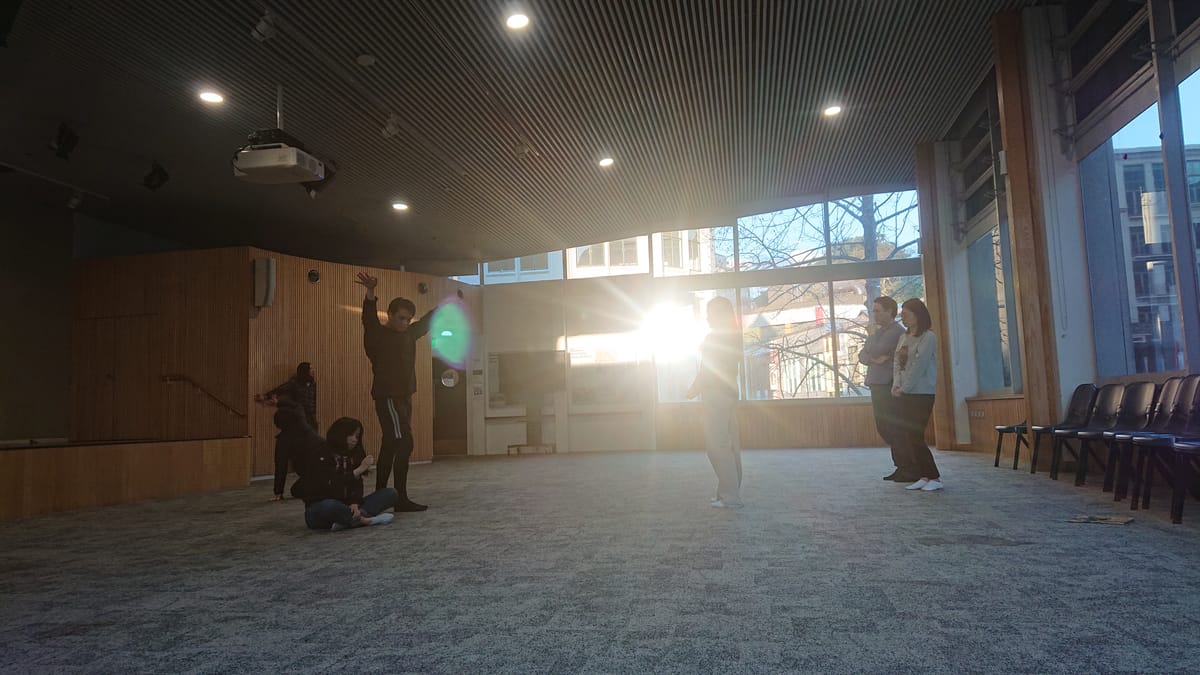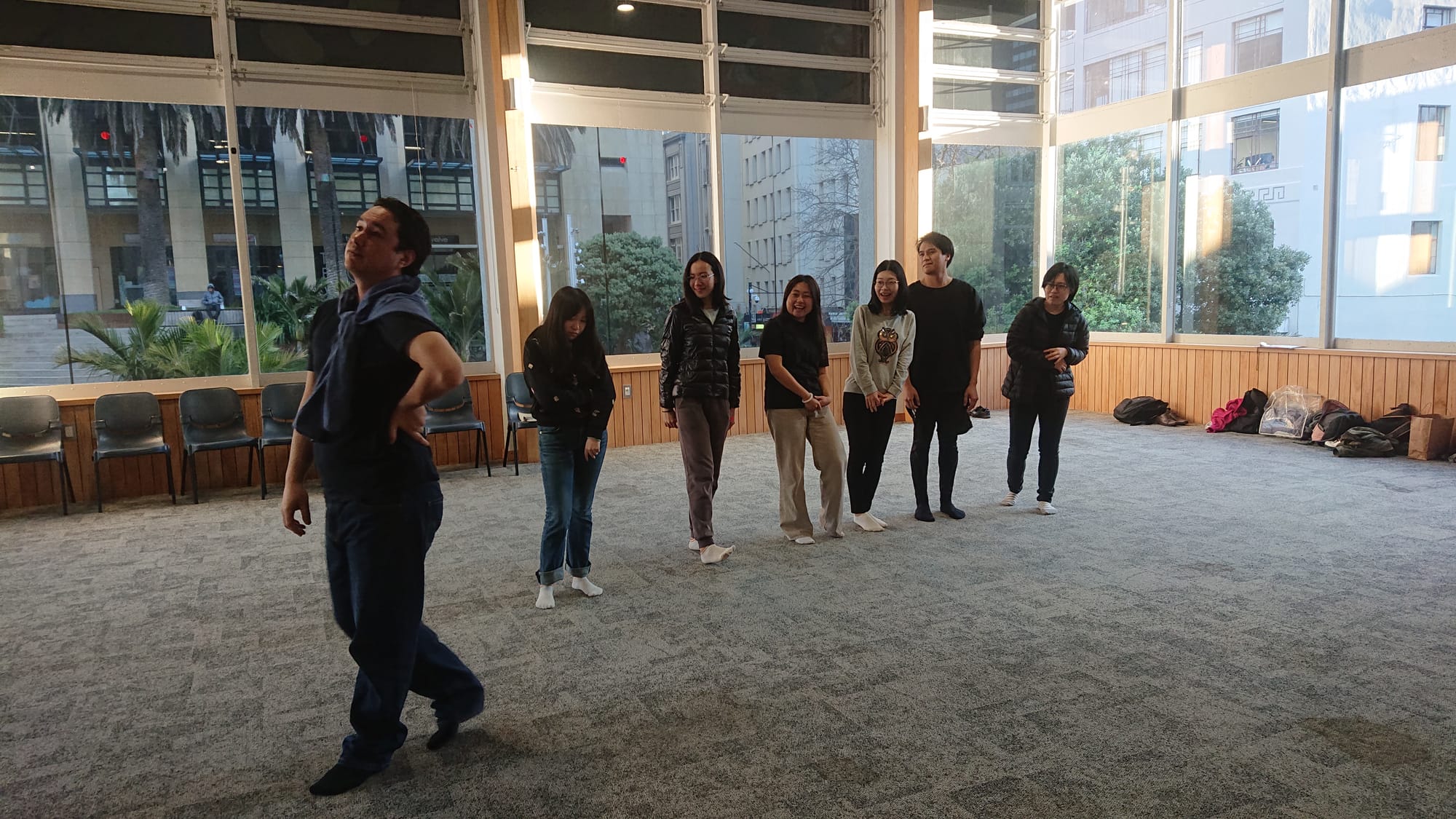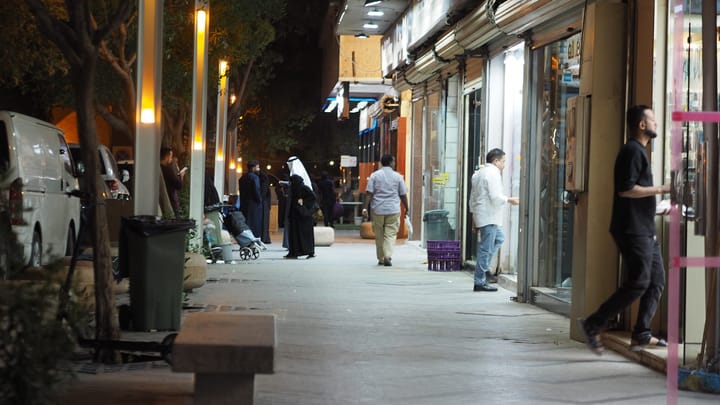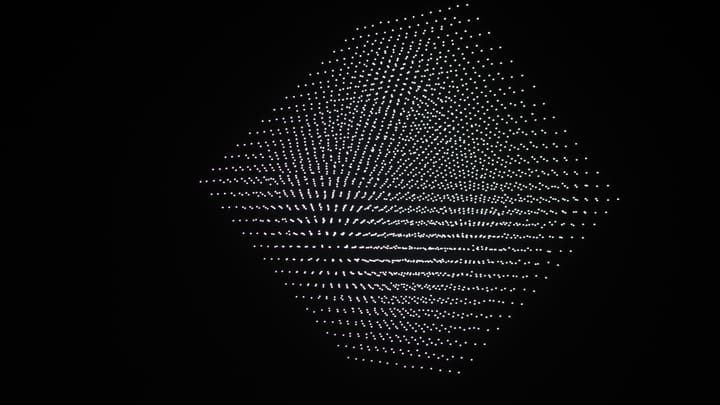Minus workshop 4, part 2: embodying emotion

I picked up God and Sex, a novel by Jon Raymond. The first lines say that for a reader a book, although zigzagging down the page, presents a straight line from end to end, but that for a writer it is a sphere. Although infinitely correctable it comes to its writer as a perfect geometrical shape. This is a good image for the virtual form given by imagination, in turn, produced by perception.
Note, the imagined form, although thought out the corner of the mind, has a form, is not formless. It doesn't take form under the guidance of the novelist's or the actor's literary or theatrical perception. The perceived image is always quite different from the imagined and virtual one. (This Deleuze says very clearly.) The point is, out the corner of the eye, writer and actor see what has form, like the form of an emotion, which they, unless they are repeating themselves or others, approach; and it has often said they have to sneak up on it, because it is a changeling. Or, in David Lynch's case, they lay out bait for it. The small idea they have, is used to catch the big one, which, Lynch says already exists, fully formed, in the next room. Where is the next room? he is asked. (I used the clip of the interview to illustrate a point in my lectures on cinema, see here.)
Rikki met me at the top of the stairs to the auditorium at Ellen Melville Centre, Kiwi, English-speaker, member of the Hobson Street Theatre Company, supported by Kāinga Ora at City Mission. The company works with homeless people. Are you here for the workshop?
He was, he said; I was surprised. How did you find out about it? He saw the poster or the page on facebook.
All five Chinese Aunties were there, getting into coats after the dance class to leave. Alex, already in the auditorium, told me he'd been instructed to extend their apologies; today they had another appointment. All of them? Together? Then Potato came up and signalled through gestures what Alex had conveyed.
Kwan, who had attended the dance class, was there, on her phone. She disappeared, returning later. Long phonecall. Chenby in Sydney, Mike away, but two more young women arrived: Summer and Cindy.
Having established they both spoke Mandarin as a first language, I asked Summer what her Chinese name was. Butterfly-Dream, she said. Great, I said, like in Zhuang-zi. I had to say Zhuang-zi a couple of time before she got it; Chen says it more like Johnnzy or Chwanzy, Summer pronounced it JWan-zuh.
When she got it, she almost burst into tears. How do you know?! How? she insisted. You're the first foreigner I have met who knows about Zhuang-zi.
There are no foreigners here, I said. We laughed, but several more times during the workshop Summer, or Butterfly-Dream, came up and repeated, I was the first foreigner . . . Cindy's Chinese name was Candle. Candle?
Yes, she said. There was a power cut in the hospital when Mum and Dad were there when I was being born, so they called me Candle. Is that unusual, is your name unusual in China?
It's not common, she said, but there are more Candles in China. And do you like your name? I am very proud of it, she said.
We waited for Chen, then I decided to get started without her. We did the first walking exercise and moved up onto the stage for the second and third parts, which is where we were when Chen arrived and Kwan came back. We are crossing the stage as fast as we can, I told Chen. Or were we already making a braiding river of voices? If it was walking, it was as fast as we could, since the stage is slippery. And there's no guard rail between the edge of the rostra and the auditorium, which, although it's carpeted, if you slipped off the stage onto, could still cause a . . . well, it's a high risk area this stage.
If braiding voices, it goes like this:
- (engaging sensitivity:) listen, now, unlike bodies and their gestures, unless you come too close, which don't enter into the bodies of others, voices and their communicative and non-communicative gestures do. So, listen:
- (engaging generosity:) One person starts. They start speaking in their first language, back to 1.
- engaging generosity in terms of the time you give them to speak; then the change: listen for modulations, when the voice might require other sounds, another voice or voices to support it. Perhaps your voice provides highlights, and rather than going down low, comes over the top, in a higher register; perhaps a whisper.
- Listen for space in the flow of the voice where your voice, your different voices, may cross over that voice, and take the river on a new path; or, cross and leave that voice to continue.
- Listen for where your voice needs, your different voices, because the flow peters out or begins to, need to keep it going; more water!
- Listen for the build, where the different streams come together, and still lacing in and out (hard to use the word weave these days), grow—imagine a cascade, a rapids, a waterfall. . .
- Listen, not for the sense, for the music of the river. . .
Because we had three new people there was a high degree of self-consciousness, which always seems to get into vocal work, much more, in fact, than physical movement, although it's still there. In voice work, it tends to constrict flows. So when I said to get louder, no river, no cascade or other poetic image eventuated. It was more chop than flow. The other odd thing is that, having asked Chen, who had recently arrived, to start the exercise, she did not speak but sang. She has a nice voice; however, to make this music means to distract ourselves from making it, by making communicative gestures which do not communicate, rather they are currents in themselves.
This "in themselves" points forward to the outcome of the workshop: the isolation of the actors when doing thief. From the voice work we went straight to life-stories. Even with the self-consciousness I thought it worth the risk.
Nobody wanted to start. A lot of explanations went this way, in English, and that, in Mandarin. Finally Rikki got up—Michael arrived and sat on one of the chairs I'd put out with a tupperware container of what looked like cheese slices. The curve of the chairs on the floor of the auditorium, under the window, seemed to me to be limiting the acting space, so I made a sweeping gesture, for Michael and Alex, who sat beyond him, to pull their chairs back further. Then Michael inexplicably left. Later I saw the cheese slices, as if he had brought them for Kwan.
Rikki performed playing as a child, shooting and exploring, being active, accompanying his performance with a narration. I liked to play as a kid. Then came school. Rikki dropped his shoulders, lowered his head. For the boxing in he suffered at school he used an image of parallel hands, sides of a box, horizontal parallel hands, lid and bottom of a box inside the first, vertical hands, sides of the box inside that one, the boxes getting smaller and smaller.
Rikki leaves school. Soon he can play again. Happily.
I asked for comments. Alex noted the boxes. Kwan said she thought it was the best.
I started with, it's not a criticism, but try... Maybe just one or two words. You are explaining everything rather than presenting this to us. Suddenly, in his next go at it, there was greater engagement with what he was acting doing but the words dried up, the sole use of his voice, to sigh heavily, school. Yes, voice work dries up under conditions of self-consciousness and under conditions of self-conscious performativity. I suggested at the end of it he might have come down on two words, play and school.
Cindy really didn't want to try, Summer, after more encouragement did. She went onto her knees, wrote with her write hand on her left palm, and acted as if flinching from being tongue-lashed, chewed the fingers of her right hand, then the wrist. She paused then was crying.
Chen asked first up if she was an actress. Chen explained to me later she thought she had trained in method acting. Summer said she had experienced, kneeling on the floor of the Ellen Melville Centre, a strong and upsetting memory from school: her maths teacher had bullied her verbally at school. He was a bully.
I dropped in the observation from my notes for the workshop (part 1) about the difference between therapy and theatre. In therapy we return to powerful a emotional event, whether traumatic or not, go back to it, dig it up if it's buried, expose it to the light. In theatre we are on our way there: but we never quite arrive at the event. It is a virtual object, like the dog-man-flicker Loren Eiseley talks about keeping pace with him as he drove through the forest, something that although not formless never settles into one form.
This indeed would be its virtue, in therapeutic terms, not settling, changing, mutating, exposing other worlds of meaning beyond and outside the monologic of bullying at school = trauma in a Minus Theatre workshop. And I suggested just this to Summer. In Minus, I said, the gesture you make which summons a world for you, for you in this example one sad enough to bring you to tears, can be taken up by others for whom, imaginatively, its meaning changes. I noticed you chewed your fingers and then the wrist of your right hand.
What if, I said, taking Summer's hand, when we are working together another actor took your hand and, cutting with an imaginary knife, chopped it off. What would you do? You'd be surprised. Shocked. And a whole new train of events would open up: perhaps you'd try to get it back. It's your hand. Come back with my hand!
Cindy too went back to school, with levity. She studied, went home, watched TV, ate dinner, brushed her teeth, slept, went on an outing, where she climbed something. She told us afterwards it had been a slagheap on a building site, she supposed, since there were some idle earth-moving machines off to the side.
3 school stories. After that, coffee-break. Yuka arrived. We ate Pam's Ginger Kisses.
Prefacing the exercise with notes from my prep (part 1) I presented The Family of Man, a 1955 exhibition of photos in a book. For some reason, I've ended up with two copies. Dad used the book in rehearsals for the visual cues to emotional states in the collected photos, but, probably closer to its date of publication. I presented the book saying, you wouldn't get a book with this title today.
We use the photos as images to be arrived at, on the understanding that you never get there, you simply are on your way there, each actor doing whatever they need to embody the emotional state in the photo. I gave the example that some actors' preparation involves research, an intellectual journey, making notes (I was thinking of Márton Csókás, who founded Stronghold Theatre with me. I saw him taking extensive notes in rehearsal for Stronghold's The Possibilities, a selection of short plays by Howard Barker, co-directed by me and Peter Evans, and commented on it, to which Márton said every process is different. That his was notetaking was something he'd learnt at Toi Whakaari, the NZ Drama School), while the process others have may be entirely physical.
We began with a photo against a background of brick row-houses of children watching a young girl strutting past in heels, hitching her skirt up with one hand, and turning her head cocquettishly away, all too aware they are there, from her onlookers. Rikki took the role. The others taking part as her audience on the street.

The other photo we worked with was of a boy standing on a toppled gravestone in a cemetery alone. Chen started. The surroundings were immediately clear. As she withdrew mentally into a kind of void, it was beautiful. I said, like the world was sucked out from behind her eyeballs.
We did a session of thief to finish. One of the things I'd forgotten to note in previous workshops, that I added now, was how, in taking the essence, an essential gesture of the actor who leads the scene, if it's not right, drop it. And relax. In other words, in Minus's work we can 'click in' and 'out' of a scene, picking up—stealing—a gesture, whether it's unconscious or a product of conscious intention on the part of that actor, and if it's not working, relax.
Pick up on something. Try it on. Put it into your body. Embody it. If it's not working, drop it. Try something else.
In the session each actor pursued their own line. They remained in themselves. Each an isolated individual.
Chen had led. Alex had been first to join her. I noted that in the connection they shared in the working space was evident their long acquaintance with Minus's way of working, and with each other. They worked together without either of them acknowledging they were, without the kind of direct encounter you'd see in conventional theatre as the dramatic point where they connected.
So I said to the group, in the next workshop we will be working on how to share the same flicker, how to be in the same emotional bubble together; and that it's all to do with how taking emotion into the body works. While this morning I thought, in theatre the emotional cause for therapy is the effect. See you next Monday 3pm at the Ellen Melville Centre, Auckland, for the workshop!
in theatre the emotional cause for therapy is the effect


